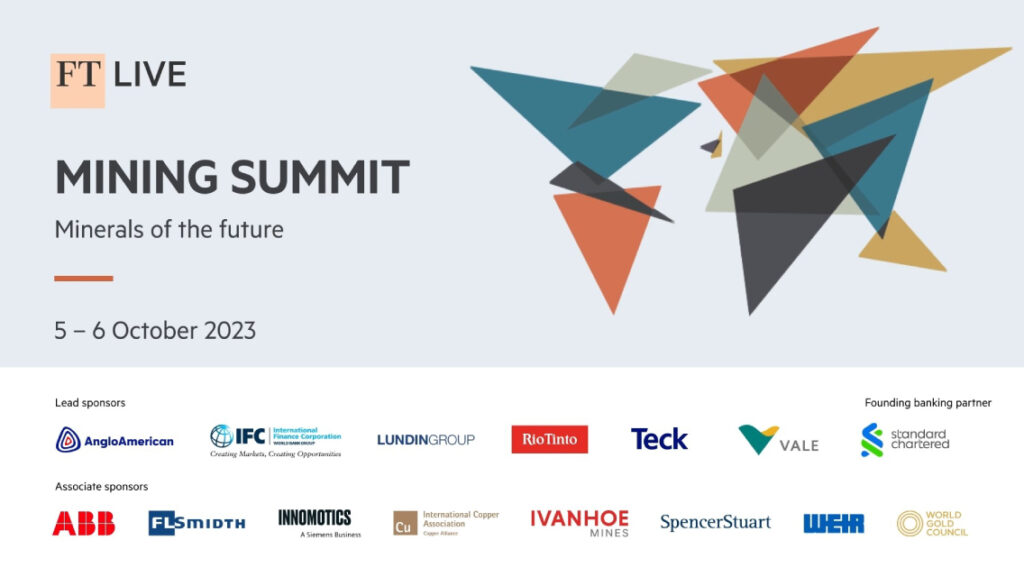FT Mining Summit: On achieving a fair transition to net zero
For mining to play its role in the energy transition, close cooperation in finance will be vital.

Mining is set to play a vital role in the energy transition, providing the raw materials for technologies from electric vehicles (EV) to hydrogen electrolysers.
At the FT Mining Summit in London, Bill Winters, CEO of Standard Chartered, addressed the mining sector’s challenges and its relationship with the finance sector in a keynote address and Q&A session with the FT’s natural resources editor, Tom Wilson.
Topics included the acute impact of inflation and high interest rates, the West’s relationship with China, bringing about a just energy transition and miners’ consistent undervaluation.
Below is an edited version of the conversation that reflects the highlights of the session.
What are the macro trends shaping banking and mining?
The mining sector is – and always has been – extremely important to the communities we operate in, and a vital client base for us.
Standard Chartered operates across emerging markets globally, with a particular focus on Asia, the Middle East and Africa. We also have substantial business in the Americas and in Europe – largely relating to our activities back in Asia, the Middle East and Africa.
I’m not going to tell you anything about the mining industry because there’s nothing I could say you don’t already know. I want to talk about some of the things we have in common. Most obviously, what does the central banks’ fight against inflation mean for global economic activity? What’s going on in China and with the net-zero transition?
I’m in the camp that sees interest rates staying higher for longer. Inflation is particularly stubborn. The US’ economic resilience is impressive. Europe has suffered less than we might have thought.
And even in some parts of the world – most obviously Sub-Saharan Africa where we’ve had some real debt-related problems – restructuring has gone quite smoothly and recovery has been more robust than many expected.
So, as we look around the world, we see a level of underlying economic activity that’s encouraging.
It’s coming through to some extent in trade – as one of the largest trade banks, we see that first-hand. But we’re also seeing it much more on the ground, in the underlying consumer and small-business resilience across the markets we operate in.
Where does China’s current economic trajectory fit in?
The sharp recovery we had hoped for in China, following the relaxation of COVID-19 rules, has petered out. And there are two schools of thought on what is going on. One is that China has had its run, whether driven by political actions, regulatory actions or demographics.
That is not our view.
We believe the Chinese leadership is keen to avoid the economic and social pitfalls other countries have encountered before them.
They tried to address the boom-and-bust scenario, which often starts with a credit cycle and ends in an economic cycle that flows through to real estate. Frequently, real estate crises lead to financial crises. And when that happens the impact on GDP growth, inequality and disruption to the social fabric is exponentially greater. We’re talking about a factor of 15 to 20 times greater. We all remember this from the 2008 financial crisis, which also started with a credit cycle, moved into a real estate cycle and then became a major financial crisis.
The Chinese government is keen to avoid this, which means excising the real estate bubble as quickly as possible. The question is whether the approach will be successful. It has certainly stabilised the property market at a lower level, but concerns remain around another potential leg-down.
Business confidence is low because of the many regulatory actions taken over the past three or four years. Foreign direct investment is down and consumer confidence is also relatively low.
Is this terminal? No, I think it is part of the cycle.
China is quite deliberately working through a process of repositioning its economy for long-term growth – at the expense of short-term growth. You will see this in your own markets in terms of demand from China.
I’m encouraged in the medium term, but we will have to see if China can navigate this unusual path successfully.
How can we ensure that the net-zero transition is fair?
The net-zero transition is central for us as a bank. And I will say with my hand on my heart, we are way ahead of the pack in terms of environmental and climate change thinking in the banking community, and finance more generally.
I am focused on developing carbon markets. They are an important mechanism, both to set a carbon price and to transmit large amounts of money into developing economies whose own net-zero transitions are under-financed right now.
We have talked with many of our clients about their transitions and how we can help with financing them. However, if one of our clients is not keen to engage with the net-zero transition, it will be difficult for us to bank with them over the long term.
There have been very few cases where we have needed to exit client relationships. Overwhelmingly, our clients are working with us, and your resolve to get to net zero is no less than ours.
That said, the transition must be just. You can’t tell people in countries like Kenya they’re not entitled to power, or that they have to transition to net zero without any support to overcome the technical deficits that stand in the way of achieving this.
Could the stand-off with the West result in China closing itself off?
We have a local Chinese business that is quite substantial but about two-thirds of our business in China is cross-border: cross-border trade, investment, foreign exchange, risk management and payments. We provide a lot of the “plumbing”.
While we see China coming under pressure from sanctions, or competition, it is also opening up faster. Its needs, not just for external capital but also for payment infrastructure, are increasing so Chinese companies can operate in many environments.
There are a handful of players, including banks like Standard Chartered, that can facilitate this “opening up”.
While China is being shut out of parts of the global economy due to geopolitical tensions, it is embracing other parts of the global economy with more vigour than before.
And so it is not surprising that those of us who represent those other parts of the economic system are well-placed. Our business in China has grown by over 50% per year in the last two years, from a big base.
How have macroeconomic changes such as high inflation and the corrective actions attempted by central banks affected your mining positions?
I think it’s been mixed.
My first question is why are the valuations in the mining sector so low? When it comes to low price-earnings (P/E) ratios, mining is only matched by European banks. I think there are some common reasons for this.
One is that we’re both very capital-intensive industries. Especially in the high-rate environment that we are in, investors are not rewarding capital-intensive industries. And there is a direct flow through to the share price.
Does high rate and high inflation affect the strategic positioning of the industry very much? I think these are transitory things. Mining has been through many cycles of margin pressure. Sometimes it’s price driven, sometimes it’s cost driven.
What matters is that the underlying demand for the materials you extract, process and refine is only going up. We see that through our financing activities in Indonesia, Sub-Saharan Africa and elsewhere. So, long term, I’m highly optimistic about this industry – but in the short term, you’ll face pressures.
Standard Chartered chairs the Net-Zero Banking Alliance, which focuses on banks setting themselves effective net-zero targets to steer their clients’ goal setting.
How effective has this approach been at driving change in industries such as mining?
First and foremost, it has affected the banking industry. We focus a lot on getting common measures and standards frameworks.
We were the first bank to release a Task Force for Climate-Related Financial Disclosures (TCDF) – report maybe six or seven years ago. It was 30 pages long. Last year, we included the seventh TCFD report in our annual report. It was 180 pages. So, the banking industry has evolved a lot.
It is a really interesting question whether the pressure that we’re under to help our clients with their transition has driven their net-zero plans, or whether they were there anyway. Because you have the same pressures from all your stakeholders – whether it’s your shareholders, your employees or your clients.
There have been some cases, particularly in our developing economies, where we have had to do a lot of education. And having different banks talk to a mining, transport or power company in Botswana, for example, all using the same language and framework is a good thing because they are reinforcing the message. In that sense, having a common communication platform has been helpful.
There’s also a common level of ambition. It hasn’t happened yet, but I don’t think it’ll be long before regulators question why we are dealing with a particular company that does not appear to comply with our net-zero policies.
We will want to respond that we understand the client’s plans and are working closely with them to activate those plans. However, as I said before, we also need the net-zero transition to be just and ensure we calibrate transition plans and pathways in different markets and industries.

Explore more insights
Finance options abound as shipping advances towards net-zero
Decarbonising global shipping comes with its share of challenges, including geopolitical and technological risks…